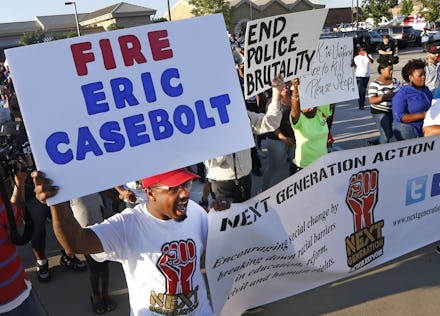We Must #SayHerName From McKinney to Madison to Oakland for This One Reason

It's been an especially brutal week for black girls in America.
First, video emerged of police officers in Madison, Wisconsin, making a violent arrest on Tuesday of Genele Laird outside of a shopping mall. The video, recorded by a bystander and originally published by U.S. Uncut, showed two white police officers tackling Laird to the ground, and then using a stun gun to subdue her. Eventually, officers put a bag over her head, allegedly to prevent her from spitting on the arresting officers. Later she was charged with disorderly conduct while armed with a knife, resisting police, battery to a police officer and discharge of bodily fluid.
Video of the arrest has sparked widespread outrage among Madison's black community.
"Here is a 120-pound kid, 18 years old," Caliph Muab'El, executive director of Breaking Barriers Mentoring Inc., told the Wisconsin State Journal. "She was thrown to the ground, bag put over her head, punched, kicked and Tased ... If that isn't excessive force, I don't know what is."
While Madison voices its anger, residents in McKinney, Texas, have become resigned with theirs. On Thursday, a grand jury declined to charge former Dallas police officer Eric Casebolt for his violent encounter last summer with 15-year-old Dajerria Becton. In the seven-minute clip that later went viral, Casebolt is seen throwing Becton to the ground and pinning her down with his knees after a dispute allegedly broke out at a pool party. At one point, he also pulled his gun out on the group of unarmed teenagers.
That video also sparked a national outpouring of anger. Casebolt resigned shortly after the incident.
"Any transformational change in the way that police interact with communities of color depends on recognizing that power has been, and continues to be, wielded most efficiently by controlling the bodies of women of color."
Both cases are reminders of why the call to #SayHerName is so important. The national movement to end police brutality has been animated by the high-profile deaths of black men like Oscar Grant, Eric Garner and Freddie Gray. But black women also face extrajudicial punishment by police forces across the United States, and our ability and willingness to center them in a discussion about race and policing in America is crucial.
This underscores the point that policing is ultimately about wielding power. Any transformational change in the way that police interact with communities of color depends on recognizing that power has been, and continues to be, wielded most efficiently by controlling the bodies of women of color.
That much became clear in the unfolding sexual abuse scandal that's currently engulfing the Oakland Police Department. Several police officers from multiple Bay Area police departments have been implicated in sexually exploiting a teenage girl. The scandal was first reported by Darwin BondGraham and Ali Winston of the East Bay Express, and the ensuing fallout has led Oakland Mayor Libby Schaaf to fire three Oakland Police Department chiefs in nine days. It's also led to national condemnation of a department that has, at least publicly, positioned itself as a leader in the fight against sex trafficking.
#SayHerName began as a rallying cry to make visible black women whose lives were ended, or altered, by police. But at its core, it is a call for change. An effort to not just recognize women of color as victims, but to realize that their victimhood makes other abuses of power possible and encodes it into the DNA of police departments that even mayors call "macho." Saying their names is the battle. Saving their lives is the war.